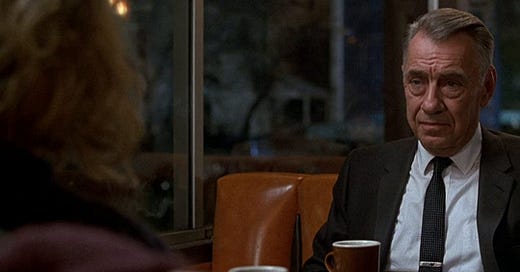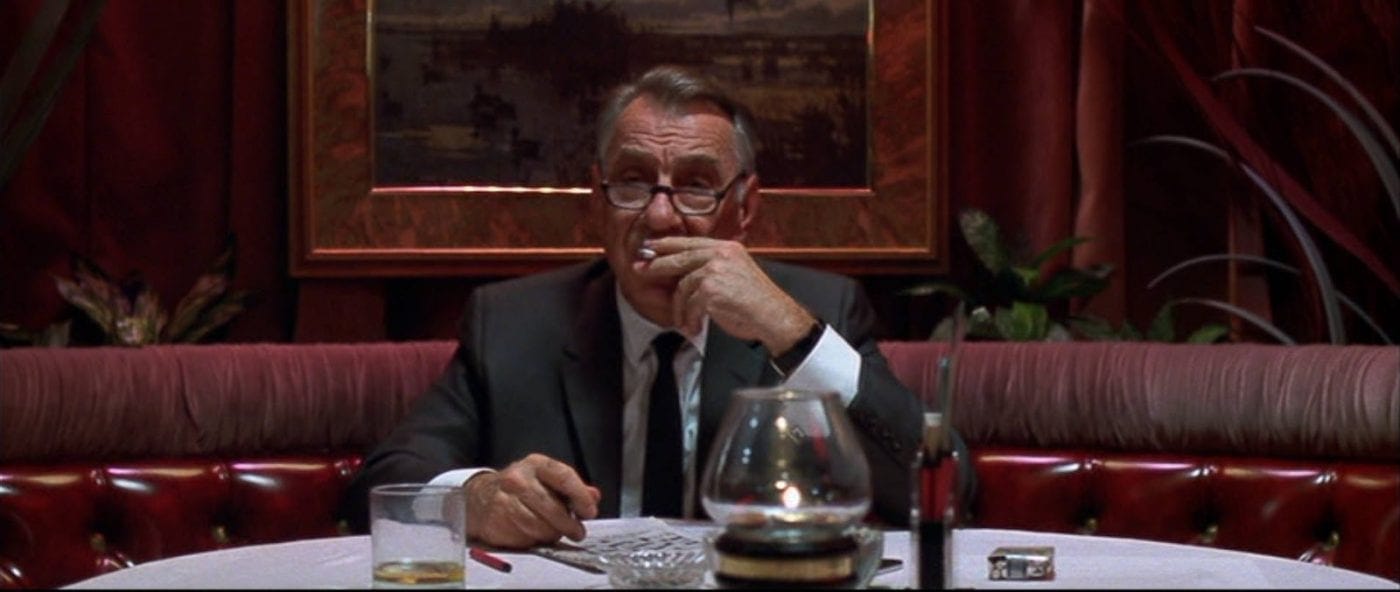On Philip Baker Hall in 'Hard Eight'
For his debut feature, P.T. Anderson made a monument for his favorite actor.
“I should say now, without any hint of anger or anything else in my voice, that I will refer to the movie that we’re watching as Sydney.” That’s Paul Thomas Anderson on the commentary track for his 1996 first feature, officially titled Hard Eight, which he calls the “bastard child” of his filmography, due to a range of contentious battles he fought for the film—of which the title is just one. Sydney is the name of a gambler played by the actor Anderson said he wrote the film for: Philip Baker Hall, who died this week at 90. Anderson calls Hall his “favorite actor in the whole world,” and tells a story about approaching him as a young PA on a PBS production, brashly declaring that one day he would make Baker a star. The two would collaborate first on “Cigarettes & Coffee,” Anderson’s 1993 Sundance short, the calling card that made this film possible. It should not be forgotten that one of the greatest directors of his generation launched his career with a monument to a character actor. Anderson wanted the world to know Hall’s name, and the original title was his way of sharpening focus.
Before Hard Eight, Hall’s most celebrated showcase was playing Richard Nixon in 1984’s Secret Honor, directed by another one of Anderson’s heroes, Robert Altman. A near-total unknown at the time, Hall didn’t try to do an impression of Nixon so much as capture his foul essence, as the disgraced former president, pacing like a caged animal in his New Jersey study in the late 1970s, rages about his political downfall. Hall’s voice had an authoritative, cut-the-bullshit sharpness to it that he deployed to great effect throughout his career, including his hilarious turn as a fine-hunting librarian in Seinfeld. But, of course, Nixon was the king of bullshit, a liar and paranoiac whose public corruption permanently stained the office of the presidency. Hall’s performance was a reminder that the voice of authority isn’t necessarily a voice we should trust.
Anderson seized on that quality for Hard Eight. He introduces Sydney as a gentleman, offering a homeless man outside a Nevada diner a cup of coffee and a cigarette—and, in short order, the opportunity to turn his life around. And it seems significant that we hear Hall’s voice first before we ever see his face, though Anderson finds that craggy landscape fascinating, too, given how his camera explores its lines like a palm reader. As the beneficiary of Sydney’s largesse, John Finnegan (John C. Reilly) has no choice but to cling to the lifeline that this stranger is extending to him, even though he questions the man’s intentions. When Sydney offers him $50 and a ride back to Las Vegas, where he’d hoped to win $6,000 for his mother’s funeral, John doesn’t want any funny business. He insists on riding in the back seat and says that he knows “three types of karate: aikido, jujitsu and regular karate.”
The Reveal is a reader-supported newsletter dedicated to bringing you great essays, reviews and conversation about movies (and a little TV). While both free and paid subscriptions are available, please consider a paid subscription to support our long-term sustainability.
That’s the tease of Hard Eight: Why? Why does Sydney take John under his wing and make him a protégé of sorts? Why does he later pay special attention to a Reno waitress, Clementine (Gwyneth Paltrow), who occasionally turns tricks with hotel guests to make ends meet? There is some distance between the image Sydney projects as a wise, dignified, generous man and the much more complicated person he actually is, but he has a talent for making guys like John—and viewers like us—forget to ask questions. His motives don’t matter much to John, not after Sydney demonstrates how to turn $150 and a rate card into a comped room and meal at a hotel, and certainly not after he makes arrangements to secure the funeral money. Two years later, when the men are living in the same Reno suite together, they’re simply friends. And that’s how Sydney would like to keep it.
That’s not how it plays out, of course. There’s a big revelation to come about Sydney’s true connection to John, but part of the genius of Hard Eight—and of Hall’s performance—is how Anderson chips away at his image before the full history comes to light. The first indicator is a character named Jimmy, played by Samuel L. Jackson, who works security for another casino and possesses knowledge about the seedier truths of the scene, including the likelihood that Clementine is a “take-home whore” like many other waitresses encouraged to “flirt” with the clientele. He remembers Sydney making “big balls bets” at the craps tables in Atlantic City, and now here he is with his reading glasses at a shitty casino in Reno, parceling out a few bucks at a time on Keno like a true degenerate.
A spark of the old malevolence flares up later during a one-scene wonder with another future Anderson favorite, Philip Seymour Hoffman, who plays exactly the sort of loudmouth who raises Sydney’s ire. As the shooter at a craps table, Hoffman calls Sydney “an old-timer” and goads him into placing a $2,000 bet on hard eight—a losing bet, as it happens, one that further diminishes his image. When Sydney shows some vulnerability by helping John and Clementine out of a bloody motel-room confrontation with one of Clementine’s clients, Jimmy plays his trump card, saying that he knows that Sydney was a connected guy back east and that he shot John’s father.
The past he’d been running from has finally caught up. And yet Hard Eight isn’t about exposing Sydney’s darkest sins, but about his sincere effort to turn the page and redeem himself. In some respects, the twist of Sydney’s relationship to John is that there is no twist: He genuinely loves John like he would his own son, and feels duty-bound to help him as much as he can. The theme of fathers and sons comes up often in Anderson’s work, connected to his own complicated relationship to his showbiz dad. Hard Eight clings to the idea that some sliver of redemption is possible for Sydney, even if paying his debt to John winds up sealing his own eternal damnation.
Much like what Quentin Tarantino did a year later with one of his favorite character actors, Robert Forster, by casting him in Jackie Brown, Anderson helped give Hall’s career a second life, including two more roles for Anderson in Boogie Nights and Magnolia. Yet Hard Eight, like Secret Honor, remains a defining part for an actor who rarely enjoyed leading-man status, but had the talent to hold the screen and inhabit characters who are irreducibly complex. Sydney is very much the gentleman he appears to be, the man Clementine nicknames “captain” for the way he presides over the casino and insists on treating her with generosity and respect. He’s also a lowly gambler and a killer, with equal command over the seediest corners of Atlantic City and Reno. Human beings are never one thing. Hall could be many things at once.






“Never ignore a man's courtesy.”
It’s the line I keep coming back to. While I much prefer the indulgent heart and propulsion of Magnolia and Hall’s performance as ‘What Do Kids Know?’ host Jimmy Gator within it, this line from Hard Eight gets right to what I loved about him as an actor. His appearance on screen was always a courtesy extended to the audience. And you could not ignore the impact he made on scenes. His Sydney is largely understated, making lines like, “This is a very fucked-up situation,” hit even harder than they might coming from a more outsized scene-chewer. The way in which he hints at undercurrents of menace and past failures is pure perfection.
For the longest time (maybe until The Master), this was my favorite P.T. Anderson film. Philip Baker Hall is the reason. I'm glad the film is called "Hard Eight" and not "Sydney," because the moment when Philip Seymour Hoffman taunts him into throwing that hard 8 is the first time we see Sydney break his own rules. We don't want to see that calm authority ruffled in any way, but that's just a taste of what's coming, as he gives up more of that careful control, and eventually sacrifices the last shreds of his soul to preserve John's illusions about him. It's just devastating to me, and so masterfully acted.